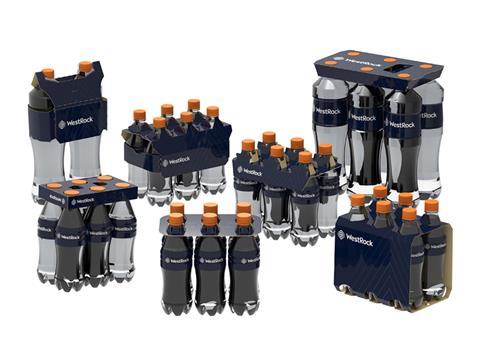
In a bid to replace over 90,000kg of plastic multipack rings, Liberty Coca-Cola is working with WestRock to implement a recyclable paperboard alternative. We spoke with Mark Shaw, Business Leader EMEA & APAC at WestRock, to learn more about the upsides – and potential downsides – of this new solution.
First things first – could you give us a topline summary on this latest development?
While we are in the business of plastic reduction and replacement with fibre where possible, it cannot be denied that recyclable PET currently still has a place as a primary container for beverages. WestRock’s PETCollar range of products removes the need for any single-use plastic – either in the form of rings or hard-to-recycle shrink film – in the distribution and display of PET bottle multipacks by replacing it with sustainable paperboard.
How did this partnership with Liberty Coca-Cola Beverages come about, and why did they choose this product?
Liberty Coca-Cola is a sustainability and innovation-driven bottler that just last year broke ground on a facility that, once complete, will generate its own electricity, heat, cooling and recovery of carbon dioxide.
Naturally, removing plastic multipack rings was also on Liberty Coca-Cola’s agenda. As a fellow sustainability and innovation-driven company, WestRock was delighted to team up to help serve Liberty’s customers with a quality product while promoting a more circular economy.
Could you tell us a bit more about the PETCollar Shield Plus solution itself? What is it, how does it work, and how is it produced?
PETCollar Shield Plus is a robust, secure, and 100 percent glue-free multipack solution for PET bottles. The beauty of it lies in its flexibility, with both small (330ml to 500ml) and large (up to 1.5l) bottles catered for in a multitude of formats – from 1x2 to 2x4; this means consistent brand equity on shelf.
Production automation is tried-and-tested using WestRock’s pioneering Fortuna machinery platform, not only for smaller bottles but large PET containers too. This is particularly useful within the European market, where we are used to seeing larger bottles packaged in the 2x3 format.
And how does it compare with traditional alternatives like plastic shrink wrap in terms of carbon emissions?
According to Euromonitor’s 2022 data, 85 percent of large PET bottles (over 750ml) in Europe are produced in shrink film. That equates to around 100,000 tonnes – a tremendous amount of plastic we can reduce from entering landfill in a best-case scenario. In the worst case, the switch to fibre drastically reduces the potential for risk to the environment and wildlife in an ongoing plastic pollution epidemic.
By choosing PETCollar, brand owners can actively contribute to reducing plastic pollution while aligning with regulatory changes like the PPWR that will rightly enforce the reduction of single-use plastics across Europe.
From a functionality point of view, how does it perform compared to plastic solutions? Does it encounter issues when wet/damp?
PETCollar is produced using Carrierkote – a high-performing unbleached kraft paperboard that is engineered for strength and to address the demands of wet and cold environments. As such, it performs well under tear testing both wet and dry.
Its proprietary coating allows the perfect surface for vibrant, quality printing – offering more branding real estate than rings while being much more resistant to warping and tearing than shrink film.
PET bottles are also regarded as a challenging product to transport due to their inherent instability when shipped as multipacks. PETCollar mitigates that and travels remarkably well, being third-party certified to EUMOS 40509:2020 standard.
If you liked this story, you might also enjoy:
How are the top brands progressing on packaging sustainability?
The ultimate guide to global plastic sustainability regulation














No comments yet